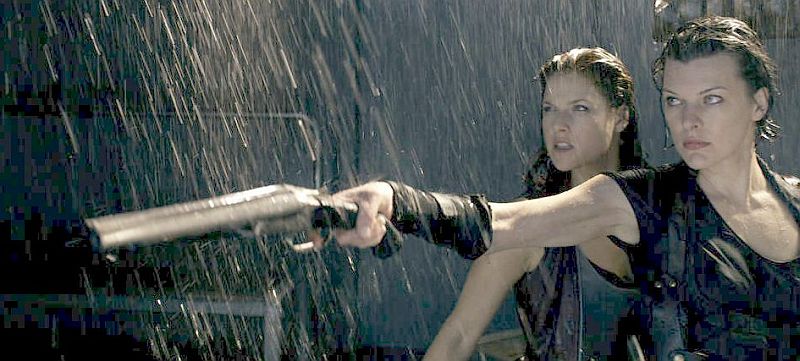
★★★
“Is There Life After Afterlife?”
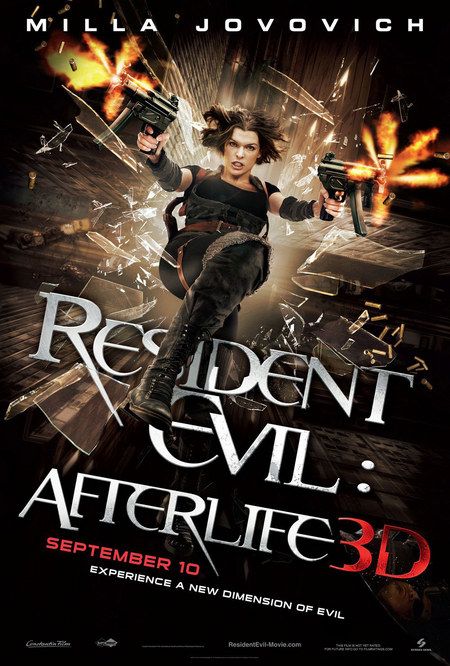 Milla Jovovich, coming at you in three dimensions! Unfortunately, Chris and 3D movies do not play well with each other – as we discovered at Avatar, where the resulting motion sickness had her staring at the back of the seat in front, after the first twenty minutes. She understandably declined all invitations to see Afterlife in this mode, so please note that with regard to this review, we’re strictly discussing the 2-D version. Other reports generally indicate the 3-D is pretty spiffy, having actually been shot that way, rather than being some hacked conversion job like certain movies I could mention [cough-ClashoftheTitans-cough]. That said, we move on.
Milla Jovovich, coming at you in three dimensions! Unfortunately, Chris and 3D movies do not play well with each other – as we discovered at Avatar, where the resulting motion sickness had her staring at the back of the seat in front, after the first twenty minutes. She understandably declined all invitations to see Afterlife in this mode, so please note that with regard to this review, we’re strictly discussing the 2-D version. Other reports generally indicate the 3-D is pretty spiffy, having actually been shot that way, rather than being some hacked conversion job like certain movies I could mention [cough-ClashoftheTitans-cough]. That said, we move on.
We keep bumping into the first Resident Evil movie, which has been on cable a lot lately, and I’m tending to think my 3 1/2-star review was an under-estimate. Maybe due to the underwhelming nature of the last couple of entries in the series, the original moves briskly, keeps a tight focus on proceedings, and has a nice character arc for Alice. I was hoping that the return of its creator, Paul W.S. Anderson, to writing and directing for this fourth installment would signal a return to this approach.
There’s really only one reason we bother with this series: to see Milla Jovovich kicking righteous ass. Everything else is – or should be – secondary. And for the first 15 minutes, it looked like this would indeed be a return to these basics, as Alice and an army of Alice-clones launched a righteous assault on the massive complex housing the Umbrella Corporation’s headquarters beneath Tokyo. It’s reminiscent of the lobby scene from The Matrix, with a swarm of Alice-alikes breaking in and hurling themselves against the guards like aggrieved lemmings, with no regard for their personal safety, as they try to take out Umbrella’s CEO’s Albert Wesker (Roberts).
It’s great: among the best scenes of the entire series, in fact. The bad news is, it’s also the best thing in the movie. The sequence would have made a great climax, but instead, everything thereafter feels like an anti-climax. Wesker escapes by helicopter, flipping the self-destruct switch and destroying the clones. However, the real Alice is aboard, and before the ‘copter crashes, he injects her with a serum that neutralizes the T-virus, rendering her human again. Boooooo-ring! Turns out they both survive the crash: quite why Wesker didn’t deal with her then, isn’t made clear. Alice heads to Alaska, in search of the haven called Arcadia where Claire Redfield (Larter) was heading at the end of the third film.
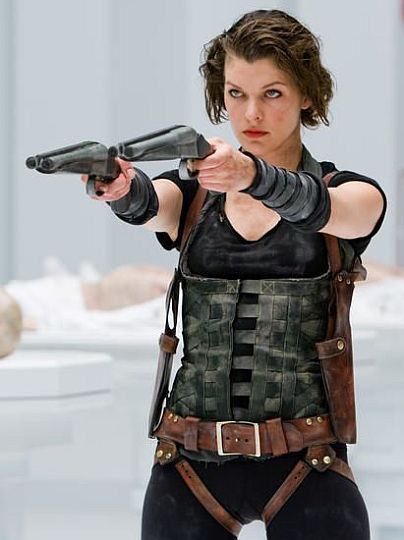 That turns out to be a red herring, but Alice does find Claire, albeit now controlled by an Umbrella device on her chest. Removing that, albeit at the cost of Claire’s memory, the pair fly back down the West coast, eventually locating a group of survivors bunkered down in an LA prison – Arcadia turns out to be the name of a boat, anchored just offshore. As the zombies break in, the survivors make their way towards the boat, with the help of a prisoner who turns out to be Chris (Miller), Claire’s brother. Reaching the Arcadia, they discover it’s a trap, designed to lure people to it for Umbrella’s research, with Wesker overseeing operations. He wants to assimilate (or “eat”) Alice; as the only person to successfully meld with the T-virus, he wants that ability to enhance his own superpowers.
That turns out to be a red herring, but Alice does find Claire, albeit now controlled by an Umbrella device on her chest. Removing that, albeit at the cost of Claire’s memory, the pair fly back down the West coast, eventually locating a group of survivors bunkered down in an LA prison – Arcadia turns out to be the name of a boat, anchored just offshore. As the zombies break in, the survivors make their way towards the boat, with the help of a prisoner who turns out to be Chris (Miller), Claire’s brother. Reaching the Arcadia, they discover it’s a trap, designed to lure people to it for Umbrella’s research, with Wesker overseeing operations. He wants to assimilate (or “eat”) Alice; as the only person to successfully meld with the T-virus, he wants that ability to enhance his own superpowers.
There’s way too much moving about in underground darkness here, and elements are lobbed in from the video game, which make no sense in the context of the movie. For instance, some zombies now have their faces split open and become all tenticular: why, is never explained, and the CGI used here is less effective than the effects used for a similar concept in Blade II, almost a decade ago. There’s also the Executioner, a giant creature wielding an even-larger weapon: again, its presence from a cinematic perspective is completely unexplained. In short, the film just doesn’t make much sense, though admittedly, between the battles, there was precious little of interest going on to hold my attention.
Nor is there much feeling of threat to the characters, who cheat death with blithe abandon – the sense of “anyone can die, at any time” present in the original is all but gone. A case in point would be the leader of the survivors, who vanished from the film entirely as they make their way out of the prison, only to reappear, right at the end, to no point whatsoever. Chris Redfield is an almost entirely superfluous character; like the monsters mentioned above, he is apparently there, just so that fans of the game can go “Look! It’s Chris Redfield!” The rest of us…not so much. The whole subplot of Alice’s humanity being restored doesn’t go anywhere either; that may well be fortunate. In any case, by the end, she seems completely back to normal. Well, “normal” in the way we want to see, anyway.
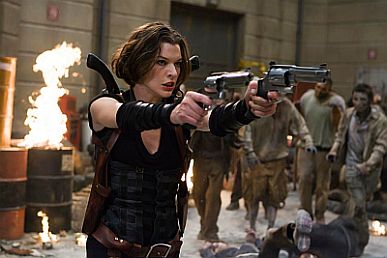 Which brings me nicely to the action, and it is, as usual for the series, solid, meaning this is, overall, just worth the 92 minutes of your time it will take up. I think due to the 3-D, the editing is more restrained than it has been of late; indeed, there’s probably as much slow-motion as anything else. I particularly liked Alice’s fondness for loading her shotgun with coins – again, I suspect largely for 3-D purposes. There’s a nice tag-match between her, Claire and the Executioner, but the final face-off versus Wesker is largely forgettable. As usual, the film ends on an interesting note: this time, it’s the return of a character last seen in Apocalypse, who makes a cameo early in the end-credits, and I wouldn’t mind seeing them return.
Which brings me nicely to the action, and it is, as usual for the series, solid, meaning this is, overall, just worth the 92 minutes of your time it will take up. I think due to the 3-D, the editing is more restrained than it has been of late; indeed, there’s probably as much slow-motion as anything else. I particularly liked Alice’s fondness for loading her shotgun with coins – again, I suspect largely for 3-D purposes. There’s a nice tag-match between her, Claire and the Executioner, but the final face-off versus Wesker is largely forgettable. As usual, the film ends on an interesting note: this time, it’s the return of a character last seen in Apocalypse, who makes a cameo early in the end-credits, and I wouldn’t mind seeing them return.
Despite the 3-D, the movie was only a mediocre success here, but a much greater hit overseas. For perspective, the percentage of total box-office coming outside North America for the first three entries was fairly constant, at 61%, 60% and 66% respectively. Afterlife got an astonishing 80% of its takings in foreign territories, grossing $236 million there, compared to only $60m in the US, barely recovering its budget. That’s one of the highest ratios of the year, and has only been surpassed a handful of times this decade, by films with a broad Stateside release. It’s this success abroad which means a fifth installment is all but certain. And as long as they keep making them, we’ll keep watching, hoping the potential, seen in flashes, might be more fully realized. A script which makes sense on its own terms, and doesn’t bother pandering to gamers, would be a good start.
Dir: Paul W.S. Anderson
Stars: Milla Jovovich, Ali Larter, Wentworth Miller, Shawn Roberts







 So opens this rare example of British grindhouse. We don’t generally
So opens this rare example of British grindhouse. We don’t generally  Let’s be clear: most of the entertainment to be found in this, is strictly of the “so bad it’s fun” variety. For instance, we perpetually found ourselves in Evil Overlord mode, i.e. “If ever I become an evil overlord, I will ensure my compound is not dotted with large, explosive barrels, clearly marked DANGER.” The lameness of this is often amusing, such as the complete aversion to nudity, an obvious product of its origins – the heroines even take baths with their clothes on. Other elements are just bizarre, if educational: it appears, if you get shot, you can jam a live snake into the wound and it will come out holding the bullet in its teeth.
Let’s be clear: most of the entertainment to be found in this, is strictly of the “so bad it’s fun” variety. For instance, we perpetually found ourselves in Evil Overlord mode, i.e. “If ever I become an evil overlord, I will ensure my compound is not dotted with large, explosive barrels, clearly marked DANGER.” The lameness of this is often amusing, such as the complete aversion to nudity, an obvious product of its origins – the heroines even take baths with their clothes on. Other elements are just bizarre, if educational: it appears, if you get shot, you can jam a live snake into the wound and it will come out holding the bullet in its teeth.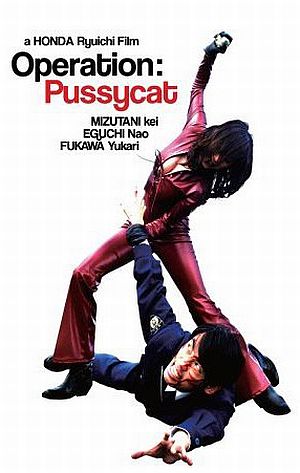 Faster, Pussycat is one of the icons of the action heroine genre, literally entire decades ahead of its time. This Japanese version uses a lot of the same elements, starting with a trio of go-go girls on the lam, under their macho leader. They stumble across a wheelchair-bound man and his muscular if taciturn companion, who appears to be stashing a large sum of money somewhere on the premises. If only they could find it… There’s also an innocent who gets entangled in the web of deceit and counter-deceit – in the original, it was because she witnessed them kill her boyfriend, while in this case, it’s after she apparently witnesses the three beat up a policeman, who stopped them for speeding, and discovered the dead body stashed in the back of their pick-up truck.
Faster, Pussycat is one of the icons of the action heroine genre, literally entire decades ahead of its time. This Japanese version uses a lot of the same elements, starting with a trio of go-go girls on the lam, under their macho leader. They stumble across a wheelchair-bound man and his muscular if taciturn companion, who appears to be stashing a large sum of money somewhere on the premises. If only they could find it… There’s also an innocent who gets entangled in the web of deceit and counter-deceit – in the original, it was because she witnessed them kill her boyfriend, while in this case, it’s after she apparently witnesses the three beat up a policeman, who stopped them for speeding, and discovered the dead body stashed in the back of their pick-up truck. A loosely-related sequel to Oshii’s last live-action film, Avalon, this is similarly set in a VR world, and muses on the relationship between real life and game life. This one is a lot less populated; there are only four people in it, roaming a desert landscape, with the targets being giant sandworms (think Dune) and the “boss” Madara, the mother of all sandworms, whom the game helpfully informs contestants, cannot be killed single-handed. The four get together to launch an attack on it, having agreed to split the game reward equally. Is that quite how things are going to turn out?
A loosely-related sequel to Oshii’s last live-action film, Avalon, this is similarly set in a VR world, and muses on the relationship between real life and game life. This one is a lot less populated; there are only four people in it, roaming a desert landscape, with the targets being giant sandworms (think Dune) and the “boss” Madara, the mother of all sandworms, whom the game helpfully informs contestants, cannot be killed single-handed. The four get together to launch an attack on it, having agreed to split the game reward equally. Is that quite how things are going to turn out? Miike has provided some of our favorite Japanese films of all-time, including Audition, Ichi the Killer and The Bird People of China, but this entry in his prolific output has to count as a misfire, being nowhere near as interesting as it sounds. Heroine Jun (Sakuraba) is abroad when her entire family is killed by Yakuza: three years later, after working as an FBI agent (!) and continuing her karate education, she returns home, to track down those responsible. She does this by going undercover in a pro wrestling promotion (!!), on the basis they can tour the country without suspicion, letting her investigate as her wrestling alter-ego, Silver. However, she’s not the only one on the hunt, with a dart-using assassin contracted to stop Jun.
Miike has provided some of our favorite Japanese films of all-time, including Audition, Ichi the Killer and The Bird People of China, but this entry in his prolific output has to count as a misfire, being nowhere near as interesting as it sounds. Heroine Jun (Sakuraba) is abroad when her entire family is killed by Yakuza: three years later, after working as an FBI agent (!) and continuing her karate education, she returns home, to track down those responsible. She does this by going undercover in a pro wrestling promotion (!!), on the basis they can tour the country without suspicion, letting her investigate as her wrestling alter-ego, Silver. However, she’s not the only one on the hunt, with a dart-using assassin contracted to stop Jun. Good to see Besson back in the director’s chair. Outside of the kids’ Arthur series, the only movie he personally helmed in the 2000’s was Angel-A, but Besson has been delivering action heroines for 20 years. Most obviously with the hugely-influential Nikita, but also in The Messenger and, to some extent The Fifth Element and Leon. Here, he goes back to just before the first World War, where journalist Adèle Blanc-Sec (Bourgoin) is kinda like a proto-Lara, whizzing around the globe in search of adventure. She heads to Egypt to grab the mummy belonging to Ramses’s physician: she’s been working with Prof. Ménard (Nahon), who has discovered how to bring the dead back to life, and wants to use the arcane knowledge the mummy possesses to help her sister, who has been in a coma for five years. But Ménard, unwilling to wait, tests his powers on a prehistoric egg: the resulting pterodactyl escapes from the museum where it is housed, and terrorizes Paris. Detective Caponi (Lellouche) is on that case…
Good to see Besson back in the director’s chair. Outside of the kids’ Arthur series, the only movie he personally helmed in the 2000’s was Angel-A, but Besson has been delivering action heroines for 20 years. Most obviously with the hugely-influential Nikita, but also in The Messenger and, to some extent The Fifth Element and Leon. Here, he goes back to just before the first World War, where journalist Adèle Blanc-Sec (Bourgoin) is kinda like a proto-Lara, whizzing around the globe in search of adventure. She heads to Egypt to grab the mummy belonging to Ramses’s physician: she’s been working with Prof. Ménard (Nahon), who has discovered how to bring the dead back to life, and wants to use the arcane knowledge the mummy possesses to help her sister, who has been in a coma for five years. But Ménard, unwilling to wait, tests his powers on a prehistoric egg: the resulting pterodactyl escapes from the museum where it is housed, and terrorizes Paris. Detective Caponi (Lellouche) is on that case… This unofficial spin-off from the Zatoichi series had us wondering if there’s a Japanese studio version of The Asylum out there – the people who specialize in knockoffs of popular films, including such classics as Snakes on a Train and Sunday School Musical. We’ll cut the makers of this some slack, since we’re of the opinion that all action films are improved with a heroine in the lead. That’s the main switch here: Zatoichi becomes Ichi (Ayase), a blind swordswoman and entertainer, who is roaming the country in search of the man she believes is her father. She is quite capable of taking care of herself, but the resulting trail of bodies is blamed on travelling companion Tomo Fujihira (Ôsawa), who becomes bodyguard to a town under assault from a gang, led by Banki (Nakamura). Unfortunately, since he accidentally blinded his mother, Tomo is unable to pull his sword from its scabbard, and the Banki gang are ready to wreak revenge on him for the members killed by Ichi.
This unofficial spin-off from the Zatoichi series had us wondering if there’s a Japanese studio version of The Asylum out there – the people who specialize in knockoffs of popular films, including such classics as Snakes on a Train and Sunday School Musical. We’ll cut the makers of this some slack, since we’re of the opinion that all action films are improved with a heroine in the lead. That’s the main switch here: Zatoichi becomes Ichi (Ayase), a blind swordswoman and entertainer, who is roaming the country in search of the man she believes is her father. She is quite capable of taking care of herself, but the resulting trail of bodies is blamed on travelling companion Tomo Fujihira (Ôsawa), who becomes bodyguard to a town under assault from a gang, led by Banki (Nakamura). Unfortunately, since he accidentally blinded his mother, Tomo is unable to pull his sword from its scabbard, and the Banki gang are ready to wreak revenge on him for the members killed by Ichi.
 Milla Jovovich, coming at you in three dimensions! Unfortunately, Chris and 3D movies do not play well with each other – as we discovered at Avatar, where the resulting motion sickness had her staring at the back of the seat in front, after the first twenty minutes. She understandably declined all invitations to see Afterlife in this mode, so please note that with regard to this review, we’re strictly discussing the 2-D version. Other reports generally indicate the 3-D is pretty spiffy, having actually been shot that way, rather than being some hacked conversion job like certain movies I could mention [cough-ClashoftheTitans-cough]. That said, we move on.
Milla Jovovich, coming at you in three dimensions! Unfortunately, Chris and 3D movies do not play well with each other – as we discovered at Avatar, where the resulting motion sickness had her staring at the back of the seat in front, after the first twenty minutes. She understandably declined all invitations to see Afterlife in this mode, so please note that with regard to this review, we’re strictly discussing the 2-D version. Other reports generally indicate the 3-D is pretty spiffy, having actually been shot that way, rather than being some hacked conversion job like certain movies I could mention [cough-ClashoftheTitans-cough]. That said, we move on. That turns out to be a red herring, but Alice does find Claire, albeit now controlled by an Umbrella device on her chest. Removing that, albeit at the cost of Claire’s memory, the pair fly back down the West coast, eventually locating a group of survivors bunkered down in an LA prison – Arcadia turns out to be the name of a boat, anchored just offshore. As the zombies break in, the survivors make their way towards the boat, with the help of a prisoner who turns out to be Chris (Miller), Claire’s brother. Reaching the Arcadia, they discover it’s a trap, designed to lure people to it for Umbrella’s research, with Wesker overseeing operations. He wants to assimilate (or “eat”) Alice; as the only person to successfully meld with the T-virus, he wants that ability to enhance his own superpowers.
That turns out to be a red herring, but Alice does find Claire, albeit now controlled by an Umbrella device on her chest. Removing that, albeit at the cost of Claire’s memory, the pair fly back down the West coast, eventually locating a group of survivors bunkered down in an LA prison – Arcadia turns out to be the name of a boat, anchored just offshore. As the zombies break in, the survivors make their way towards the boat, with the help of a prisoner who turns out to be Chris (Miller), Claire’s brother. Reaching the Arcadia, they discover it’s a trap, designed to lure people to it for Umbrella’s research, with Wesker overseeing operations. He wants to assimilate (or “eat”) Alice; as the only person to successfully meld with the T-virus, he wants that ability to enhance his own superpowers. Which brings me nicely to the action, and it is, as usual for the series, solid, meaning this is, overall, just worth the 92 minutes of your time it will take up. I think due to the 3-D, the editing is more restrained than it has been of late; indeed, there’s probably as much slow-motion as anything else. I particularly liked Alice’s fondness for loading her shotgun with coins – again, I suspect largely for 3-D purposes. There’s a nice tag-match between her, Claire and the Executioner, but the final face-off versus Wesker is largely forgettable. As usual, the film ends on an interesting note: this time, it’s the return of a character last seen in Apocalypse, who makes a cameo early in the end-credits, and I wouldn’t mind seeing them return.
Which brings me nicely to the action, and it is, as usual for the series, solid, meaning this is, overall, just worth the 92 minutes of your time it will take up. I think due to the 3-D, the editing is more restrained than it has been of late; indeed, there’s probably as much slow-motion as anything else. I particularly liked Alice’s fondness for loading her shotgun with coins – again, I suspect largely for 3-D purposes. There’s a nice tag-match between her, Claire and the Executioner, but the final face-off versus Wesker is largely forgettable. As usual, the film ends on an interesting note: this time, it’s the return of a character last seen in Apocalypse, who makes a cameo early in the end-credits, and I wouldn’t mind seeing them return.

















 The most disappointing film of 2010? I went in with huge expectations, based on reviews that said, “The best swordplay film since Crouching Tiger, Hidden Dragon..” O RLY? I know Crouching Tiger. Crouching Tiger is one of my favourite movies. And Reign of Assassins, you’re no Crouching Tiger. It’s a confused, poorly-shot mess that proved a struggle to endure and a challenge to stay awake, right from the opening lump of introduction. Stick with me for this synopsis. The remains of a Buddhist monk, split in two, are said to turn whoever has them into a kung-fu master. The Dark Stone gang, under the Wheel King (Wang), want to possess them, and get one half, but gang member Drizzle makes off with the body parts, undergoes plastic surgery that turns her into Michelle Yeoh and takes up a quiet life as a fabric seller. She meets and marries Jiang Asheng (Jung), until her secret identity is revealed in a bank raid, and the Dark Stone gang come after her again. However, turns out Jiang isn’t who he seems either…
The most disappointing film of 2010? I went in with huge expectations, based on reviews that said, “The best swordplay film since Crouching Tiger, Hidden Dragon..” O RLY? I know Crouching Tiger. Crouching Tiger is one of my favourite movies. And Reign of Assassins, you’re no Crouching Tiger. It’s a confused, poorly-shot mess that proved a struggle to endure and a challenge to stay awake, right from the opening lump of introduction. Stick with me for this synopsis. The remains of a Buddhist monk, split in two, are said to turn whoever has them into a kung-fu master. The Dark Stone gang, under the Wheel King (Wang), want to possess them, and get one half, but gang member Drizzle makes off with the body parts, undergoes plastic surgery that turns her into Michelle Yeoh and takes up a quiet life as a fabric seller. She meets and marries Jiang Asheng (Jung), until her secret identity is revealed in a bank raid, and the Dark Stone gang come after her again. However, turns out Jiang isn’t who he seems either…